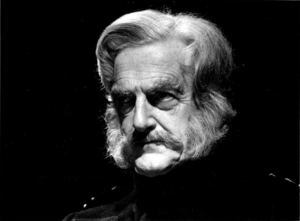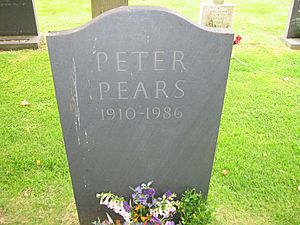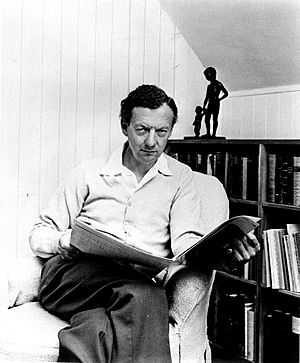Peter Pears facts for kids
Quick facts for kids
Peter Pears
|
|
|---|---|

Pears as General Wingrave in Britten's OwenWingrave, 1971
|
|
| Born |
Peter Neville Luard Pears
22 June 1910 Farnham, Surrey, England
|
| Died | 3 April 1986 (aged 75) The Red House, Aldeburgh, Suffolk, England
|
| Occupation | Singer |
| Partner(s) | Benjamin Britten (1939–1976; Britten's death) |
Sir Peter Neville Luard Pears CBE (/ˈpɪərz/ PEERZ; 22 June 1910 – 3 April 1986) was a famous English tenor singer. He worked very closely with the composer Benjamin Britten. They were close friends and professional partners for nearly 40 years.
Peter Pears' music career began slowly. He wasn't sure if he should play the piano or organ, or sing. But after meeting Britten in 1937, he decided to focus on singing. Britten wrote many songs and operas especially for Pears' voice. Pears sang in more than ten of Britten's operas.
As a team, Pears and Britten were well-known for their concerts. They were especially good at performing German songs called lieder by Schubert and Schumann. They recorded most of the music Britten wrote for Pears, plus many other songs. Pears also sang a wide range of music from different time periods with other musicians.
With Britten, Pears helped start the Aldeburgh Festival in 1947. They also founded the Britten-Pears School in 1972. After Britten passed away in 1976, Pears continued to be involved with the festival and the school. He was the director of singing there. Pears had a unique voice, and he was very skilled at singing many different types of music.
Contents
Life and Career of Peter Pears
Early Life and School Days
Peter Pears was born in Farnham, Surrey, England, on June 22, 1910. He was the youngest of seven children. His father was an engineer who often worked overseas. Peter had a happy childhood, even though his parents were sometimes away.
He enjoyed his school days at The Grange and Lancing College. He was very talented in music, playing the piano and singing. He even had lead roles in school plays of Gilbert and Sullivan operas. Peter also loved cricket and was proud of his scores. While at Lancing, he thought about becoming a priest.
In 1928, Pears went to Keble College, Oxford to study music. He wasn't sure if he wanted to be a singer or a musician. He didn't finish his studies at Oxford because he found the academic work difficult.
Becoming a Singer
After leaving Oxford, Pears taught at his old school for a short time. His friend, Nell Burra, encouraged him to become a singer. He later said that hearing the tenor Steuart Wilson sing in a famous piece called St Matthew Passion inspired him.
Pears then joined the Royal College of Music in London. He performed in student operas and learned a lot from singing with famous conductors. He also joined the BBC Singers, a small group of vocalists, for two years.
In 1936, Pears made his first solo recording. His voice was described as thoughtful and sensitive. Around this time, he became good friends with the young composer Benjamin Britten. They became even closer after their friend Peter Burra died in an air crash in 1937. Pears quickly became Britten's musical inspiration. Britten wrote his first piece for Pears, "A thousand gleaming fires," soon after they met.
Britten's music helped Pears focus more on his singing career. Pears also took singing lessons to improve his voice. In 1938, he gained his first professional opera experience at Glyndebourne Festival Opera.
Journey to America and Wartime Experiences
In April 1939, Pears traveled with Britten to North America. They went to Canada and then to New York. During this time, their friendship grew even stronger, and they became life partners.
When World War II started, the British embassy told them to stay in the US as "artistic ambassadors." Pears wanted to go back to England, but Britten convinced him to stay.
In 1940, Britten wrote Seven Sonnets of Michelangelo, a set of songs for Pears. This was the first of many song cycles Britten would write for him. These songs showed Britten's deep affection for Peter.
In 1941, Pears gave Britten a book of poems called The Borough by George Crabbe. Pears suggested that the story of the fisherman Peter Grimes would make a great opera. Britten, who was from Suffolk like Crabbe, loved the idea. This made them want to return to England. They sailed back across the Atlantic in April 1942.
Back in England, Britten and Pears were officially recognized as conscientious objectors. This meant they didn't have to fight in the war because of their beliefs. One of their first performances after returning was the public premiere of the Michelangelo songs in September 1942. Britten was so impressed by Pears' voice that he started writing more music specifically for him, like the popular Serenade for Tenor, Horn and Strings (1943).
In 1943, Pears joined the Sadler's Wells Opera Company. He sang many important roles, including Tamino in The Magic Flute and Rodolfo in La bohème. His experience in opera helped Britten create the character of Peter Grimes. Britten had first imagined Peter Grimes as a villainous baritone, but he changed the role to a tenor to fit Pears' voice. In 1944, Britten and Pears began working with the Decca Record Company, making many recordings together.
Peter Grimes and the English Opera Group
As the war ended, the Sadler's Wells company decided to open their London home with Britten's new opera, Peter Grimes. The main roles were given to Peter Pears and the singer Joan Cross. Some people in the company complained about this and about Britten's music.
Peter Grimes opened in June 1945 and was a huge success with both the public and critics. Pears and Cross received great praise for their performances. Because of some disagreements within the company, Cross, Britten, and Pears left Sadler's Wells in December 1945. They then decided to create their own group, which became the English Opera Group.
The English Opera Group was formed to create and perform new English operas. Britten wrote a funny opera called Albert Herring for the group in 1947. Pears played the main character, Albert, a shy "mother's boy" who finally stands up for himself. Pears' performance as Albert was highly praised.
The Aldeburgh Festival
While touring with Albert Herring, Pears had an idea to start a music festival in Aldeburgh, a small seaside town in Suffolk. Britten had bought a house there, and it became his main home. The first Aldeburgh Festival began in June 1948, with Britten, Pears, and Eric Crozier as directors.
For the first festival, Albert Herring was performed, and Britten's new cantata, Saint Nicolas, was presented in the local church, with Pears as the main singer. The festival was an instant success and became an annual event that continues today.
Britten's new works were performed at almost every festival until he passed away in 1976. Many of these operas had leading roles created by Pears, written especially for his voice. These roles ranged from funny characters like Flute in A Midsummer Night's Dream (1960) to very serious ones like Aschenbach in Death in Venice (1973).
Pears also sang in other operas for the English Opera Group. He performed in Britten's version of The Beggar's Opera and in Mozart's Idomeneo. At the Covent Garden, he created roles in Britten's operas like Vere in Billy Budd (1951) and Essex in Gloriana (1953).
Throughout the 1940s and 1950s, Pears expanded his concert performances. He sang in famous works like The Dream of Gerontius and Das Lied von der Erde. He became known internationally for singing the Evangelist in Bach's St Matthew Passion. Critics praised his ability to show all the emotions in the story.
When Pears sang German Lieder by Schubert and Schumann, Britten almost always played the piano for him. Their performances were considered a perfect artistic match. They recorded famous song cycles like Die schöne Müllerin and Winterreise, which are still popular today.
Later Years and Legacy
One of the most important moments in Pears' career in the 1960s was the premiere of Britten's War Requiem in May 1962. Britten wrote this piece for three specific singers: Pears, Dietrich Fischer-Dieskau, and Galina Vishnevskaya. Although Vishnevskaya couldn't perform at the premiere, all three sang in a very successful recording of the work in 1963.
Besides his partnership with Britten, Pears also worked closely with Julian Bream, a lute player. They performed many pieces together, especially music from the Tudor period in England.
Pears and Britten traveled a lot, performing around the world. They also made many radio broadcasts and recordings. In the 1970s, Pears created roles in Britten's last two operas: General Wingrave in Owen Wingrave (1971) and Aschenbach in Death in Venice (1973). Pears made his debut at the Metropolitan Opera in New York in Death in Venice when he was 64 years old.
After Britten passed away in 1976, Pears found another great piano player to work with, Murray Perahia. They performed Britten's Michelangelo Sonnets and Schumann's Liederkreis to great acclaim.
Pears continued to perform until a stroke ended his singing career in 1980. He was 70 years old. After that, he remained active as a director of the Aldeburgh Festival. He also taught at the Britten-Pears School, which he and Britten had founded in 1972.

Peter Pears passed away in Aldeburgh on April 3, 1986, at the age of 75. He was buried next to Benjamin Britten in the churchyard of St Peter and St Paul's Church in Aldeburgh.
Honours and Awards
Peter Pears received many awards and honorary degrees from music schools and universities in the UK and US. He was made a Commander of the Order of the British Empire (CBE) in 1957. He was also knighted in 1978, which means he was given the title "Sir." Other awards included the Queen's Jubilee Medal in 1977 and Musician of the Year in 1978.
Recordings
Peter Pears recorded almost all the music Britten wrote for him with the Decca Record Company. He also recorded music by other composers, from early music by Dowland and Schütz to modern works. His recordings include the Emperor in Puccini's Turandot and the main role in Stravinsky's Oedipus Rex. For other companies, he recorded the Evangelist in Bach's St Matthew Passion and music by Fauré.
See also
 In Spanish: Peter Pears para niños
In Spanish: Peter Pears para niños


